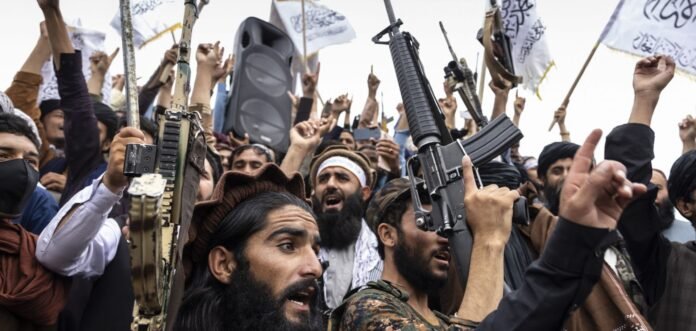The Taliban regime in Afghanistan has once again stirred controversy by publicly executing two individuals convicted of murder. The executions took place in a football stadium in front of a large crowd, signaling a return to brutal justice under the Taliban’s rule.
The condemned individuals, whose identities were not disclosed, were brought to the stadium where they were publicly shot in the head by Taliban fighters. The execution was carried out as a form of punishment for their crimes and as a warning to others.
The spectacle of public executions in a football stadium harks back to the harsh and oppressive tactics employed by the Taliban during their previous rule in Afghanistan. It serves as a stark reminder of the Taliban’s disregard for human rights and their brutal methods of enforcing their interpretation of Islamic law.
The executions have sparked outrage both within Afghanistan and internationally. Human rights organizations have condemned the Taliban’s actions, labeling them as barbaric and inhumane. The United Nations and various governments have called for an immediate halt to the practice of public executions and for the Taliban to respect the rule of law and due process.
The resurgence of public executions under the Taliban has raised concerns about the future of human rights and justice in Afghanistan. Many fear that the Taliban’s return to power will lead to a rollback of the progress made in the country over the past two decades, particularly in terms of women’s rights and freedoms.
About Taliban Militant Group
The executions come amid growing international scrutiny of the Taliban’s actions since their takeover of Afghanistan. The militant group has faced criticism for its crackdown on dissent, restrictions on media freedom, and failure to uphold the rights of women and minorities.
Despite widespread condemnation, the Taliban has defended its actions, arguing that they are enforcing Sharia law and maintaining law and order in the country. However, critics argue that the executions are a clear violation of international human rights standards and demonstrate the Taliban’s disregard for fundamental principles of justice and fairness.
The executions have further fueled concerns about the Taliban’s intentions and their commitment to governing Afghanistan in a responsible and inclusive manner. Many fear that the group’s hardline interpretation of Islam will result in widespread human rights abuses and undermine efforts to achieve peace and stability in the country.
As Afghanistan grapples with the challenges of a new era under Taliban rule, the international community continues to monitor the situation closely and calls for the protection of human rights and the rule of law.
Following the executions, reports emerged of widespread fear and intimidation among the local population, with many expressing concern about the Taliban’s brutal methods of enforcing their rule. Witnesses described a climate of terror and oppression, with residents hesitant to speak out or defy Taliban directives for fear of reprisals.
Human rights activists and organizations have documented numerous cases of arbitrary arrests, disappearances, and extrajudicial killings by Taliban forces since they took control of Afghanistan. The executions serve as a chilling reminder of the dangers faced by those who oppose or challenge the Taliban’s authority.
In response to the executions, calls for action from the international community have grown louder, with many urging governments and global institutions to hold the Taliban accountable for their human rights abuses. There have been renewed calls for targeted sanctions, diplomatic pressure, and increased humanitarian aid to support those affected by the Taliban’s repressive policies.
The executions have also raised questions about the role of neighboring countries and regional powers in shaping the future of Afghanistan. Many observers have criticized the lack of concerted action from neighboring states to address the deteriorating situation in Afghanistan and prevent further violence and instability.
Amid the growing humanitarian crisis in Afghanistan, aid organizations have warned of the urgent need for humanitarian assistance to address the basic needs of the population, including food, shelter, and medical care. The executions have only exacerbated the suffering of ordinary Afghans already struggling to survive in the midst of conflict and political turmoil.
As the international community grapples with the aftermath of the executions and seeks to address the ongoing crisis in Afghanistan, there is a pressing need for coordinated action to protect human rights, uphold the rule of law, and support the Afghan people in their quest for peace, security, and stability.

